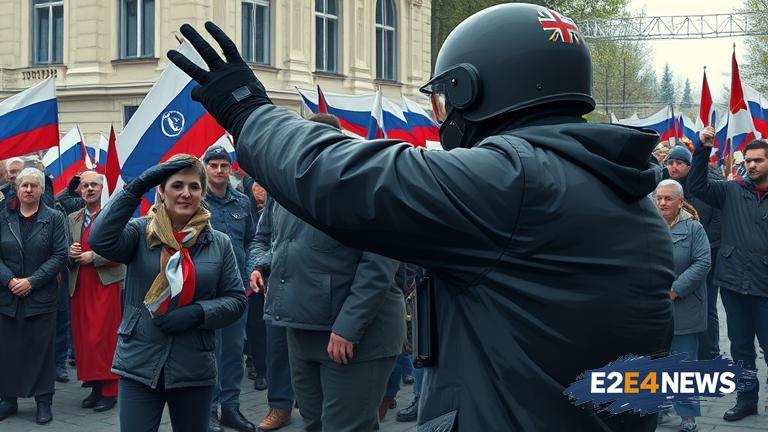A disturbing incident has shaken the Slovakian community, as a lawyer was brutally attacked after confronting a group of men giving Nazi salutes in a public place. The incident has sparked widespread outrage and raised concerns about the growing presence of pro-Russian extremist groups in the country. According to eyewitnesses, the lawyer had approached the group and asked them to stop making the offensive gestures, but was met with violence and intimidation. The attackers, who were reportedly linked to a pro-Russian group, allegedly beat the lawyer and left him with serious injuries. The incident has been condemned by Slovakian authorities, who have vowed to take action against those responsible. The attack has also sparked a wider debate about the rise of extremism in Slovakia, with many calling for greater action to be taken to prevent the spread of hate groups. Pro-Russian extremist groups have been increasingly active in Slovakia in recent years, often using social media and other online platforms to spread their ideology and recruit new members. These groups often promote a toxic mix of nationalism, racism, and anti-Semitism, and have been linked to a number of violent incidents in the country. The Slovakian government has faced criticism for not doing enough to tackle the problem of extremism, with some arguing that more needs to be done to prevent the spread of hate speech and to support those who are targeted by extremist groups. The attack on the lawyer has also highlighted the importance of protecting freedom of speech and the right to confront hate groups. Many have praised the lawyer for his bravery in standing up to the extremist group, and have called for greater support for those who are willing to challenge hate speech and extremism. The incident has also sparked a wider discussion about the role of social media in spreading extremism, with many calling for greater action to be taken to prevent the spread of hate speech online. Slovakian authorities have vowed to increase their efforts to monitor and prevent the spread of extremist content online, and to work with social media companies to remove hate speech and other forms of extremist content. The attack on the lawyer has also highlighted the need for greater international cooperation to tackle the problem of extremism, with many arguing that extremist groups often operate across borders and require a coordinated response. The Slovakian government has faced criticism for its response to the attack, with some arguing that more needs to be done to support the victim and to prevent similar incidents in the future. The incident has also sparked a wider debate about the role of Russia in promoting extremism in Eastern Europe, with many arguing that the Kremlin has been actively supporting and promoting extremist groups in the region. The Slovakian government has vowed to take a stronger stance against Russian interference in the country’s affairs, and to work with international partners to prevent the spread of extremism. The attack on the lawyer has also highlighted the importance of protecting human rights and the rule of law in Slovakia, with many arguing that the government needs to do more to support those who are targeted by extremist groups. The incident has sparked widespread outrage and condemnation, with many calling for greater action to be taken to prevent the spread of extremism and to protect those who are targeted by hate groups. The Slovakian government has faced criticism for not doing enough to tackle the problem of extremism, and has vowed to increase its efforts to prevent the spread of hate speech and to support those who are targeted by extremist groups. The attack on the lawyer has also highlighted the need for greater awareness and education about the dangers of extremism, with many arguing that more needs to be done to prevent the spread of hate speech and to promote tolerance and understanding. The incident has sparked a wider debate about the role of civil society in promoting tolerance and preventing the spread of extremism, with many arguing that more needs to be done to support community groups and organizations that are working to promote human rights and the rule of law.
